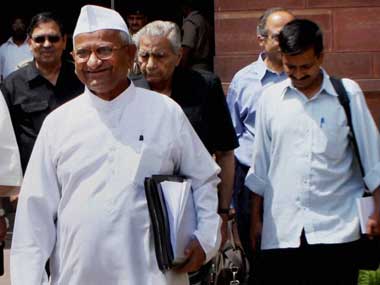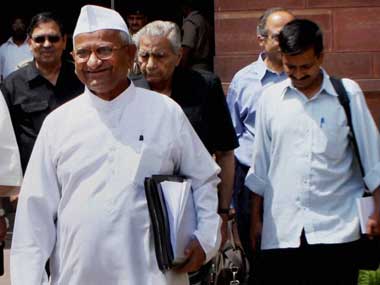In an
iconic scene in the Mahabharata
, Drona ‘tests’ his archery students on their power of focus by asking them to shoot a wooden bird target in the eye. When Yudhishtra, Aswathama and others step up to fire an arrow, Drona asks them what they have in their sights. One says he sees the sun, the trees, the clouds and so on – and ends up missing the target. Another sees the bird, its legs, even a mango behind the bird – and a worm near the bird. But while his power of eyesight wins much acclaim, he too misses his target by a wide margin. When Arjuna steps up, he says he sees “only the bird’s eye”. Such is his power of focus that he blots out everything else, and therefore hits bull’s eye (or more appropriately, bird’s eye). The anti-corruption movement - which too is a modern-day Mahabharata of sorts - can well take a lesson from Arjuna’s power of focus. [caption id=“attachment_22573” align=“alignright” width=“380” caption=“Anna Hazare and his strategically minded supporters should - and can - regain the momentum in the campaign against corruption. Reuters”]
 [/caption] Barely two months ago, the Anna Hazare-led movement was riding high, with unity of focus, and the strength of virtually unanimous support from civil society. It had one clear focus: putting in place an effective Lok Pal institution mechanism that could initiate and fast-track action against corruption. But today, following a whirlwind of dramatic political action following the
well-meaning but artless intervention by Baba Ramdev
, the anti-corruption movement is in disarray, and the Congress appears to have regained the momentum. The fact that a discredited, potty-mouthed politician like
Digvijay Singh rules the airwaves
is a telling commentary on how low our politics have sunk. Ramdev’s focus on “bringing back the black money” stashed by Indians overseas is, of course, a serious issue that certainly deserves our attention. But the process of
retrieving black money is much more complicated
, involving secrecy-cloaked tax havens abroad that are structured in precisely such a way as to defeat the efforts of national governments to retrieve the loot. As Dev Kar, lead economist at the Global Financial Integrity, Centre for International Policy, notes in his paper on An Empirical Study on the Transfer of Black Money from India: 1948: 2008
: There continue to be sporadic reports in the Indian media of “getting the money back” from various tax havens around the world. This too is sensationalism with scant regard for the legal and other challenges involved. Illicit assets are typically lodged in secrecy jurisdictions behind a tight wall of opacity. Moreover, complex financial instruments such as derivatives and trust companies are structured in such a way that tracing the ultimate benefi ciary of such investments is next to impossible. Furthermore, proving that a certain individual received illicit funds from a specific source for a specific illegal activity (as a result of bribery, kickbacks, drug trafficking, etc) and then transferred those funds on a specific date to a specific account in a secrecy jurisdiction is almost impossible to do in a court of law. To make matters more difficult, offshore centres, tax havens, and even developed country banks would not permit any government agency to go on a “fishing expedition” by allowing them to trawl through their accounts in search of illicit funds. Hence, the legal challenges involved in linking illicit funds to specifi c account holders would be almost impossible to surmount. Even strong-willed governments have had only limited success in retrieving black money from these tax havens. The US, which made much of its arm-twisting of Swiss banks to reveal their clients’ list, is realising the limits of its reach, and is itself becoming a tax haven: if you can’t beat them, join them. The UPA government has not exhibited even a modicum of earnestness in tracing black money overseas: in fact, even when it has been offered the list of Indian names on a platter, it has been dragging its feet. For that reason, it has been repeatedly reprimanded by the Supreme Court, which has been proactively tracking the case. All this is not to say that the campaign against retrieving black money isn’t worth waging: it is. But for it to go beyond mere theatrics, we need more than an emotionally-swaying appeal. We need strategic ideas. And by raising the issue of recovering black money from tax havens, without fully understanding the complexities of the matter, Baba Ramdev unwittingly muddied the waters for the anti-corruption movement and allowed the Congress to divert attention away from the campaign for a strong and effective Lok Pal, which was and should remain the primary focus for now. While Baba Ramdev is recuperating from the exertions of his fast, he should read Nicholas Shaxson’s Treasure Islands: Tax Havens and the Men Who Stole the World
: it will inform him a little bit more about the complexity of the issue, and perhaps help him come up with concrete ideas, rather than an emotional – but completely useless – hectoring about “bringing back the black money” stashed abroad. For now, the focus of the anti-corruption movement must be firmly on the “bird’s eye”: the Lok Pal Bill. Having a strong Lok Pal institution will, as one of the commentators here noted, create an alternative power centre that will keep watch on the political establishment, and skew the risk-reward ratio in a way that corrupt politicians will be made to work harder to be corrupt. That is as good a beginning as any in the campaign against corruption. Anna Hazare and his band of
astute, strategically-minded men
– who have the support of the people and know how to work the levers of the state – must once again exert pressure on the government to ensure that the Lok Pal Bill isn’t an eyewash. If that enterprise succeeds, it could be a momentous milestone in the anti-corruption movement. If not, we can always begin our
“second freedom struggle” on August 16
.
[/caption] Barely two months ago, the Anna Hazare-led movement was riding high, with unity of focus, and the strength of virtually unanimous support from civil society. It had one clear focus: putting in place an effective Lok Pal institution mechanism that could initiate and fast-track action against corruption. But today, following a whirlwind of dramatic political action following the
well-meaning but artless intervention by Baba Ramdev
, the anti-corruption movement is in disarray, and the Congress appears to have regained the momentum. The fact that a discredited, potty-mouthed politician like
Digvijay Singh rules the airwaves
is a telling commentary on how low our politics have sunk. Ramdev’s focus on “bringing back the black money” stashed by Indians overseas is, of course, a serious issue that certainly deserves our attention. But the process of
retrieving black money is much more complicated
, involving secrecy-cloaked tax havens abroad that are structured in precisely such a way as to defeat the efforts of national governments to retrieve the loot. As Dev Kar, lead economist at the Global Financial Integrity, Centre for International Policy, notes in his paper on An Empirical Study on the Transfer of Black Money from India: 1948: 2008
: There continue to be sporadic reports in the Indian media of “getting the money back” from various tax havens around the world. This too is sensationalism with scant regard for the legal and other challenges involved. Illicit assets are typically lodged in secrecy jurisdictions behind a tight wall of opacity. Moreover, complex financial instruments such as derivatives and trust companies are structured in such a way that tracing the ultimate benefi ciary of such investments is next to impossible. Furthermore, proving that a certain individual received illicit funds from a specific source for a specific illegal activity (as a result of bribery, kickbacks, drug trafficking, etc) and then transferred those funds on a specific date to a specific account in a secrecy jurisdiction is almost impossible to do in a court of law. To make matters more difficult, offshore centres, tax havens, and even developed country banks would not permit any government agency to go on a “fishing expedition” by allowing them to trawl through their accounts in search of illicit funds. Hence, the legal challenges involved in linking illicit funds to specifi c account holders would be almost impossible to surmount. Even strong-willed governments have had only limited success in retrieving black money from these tax havens. The US, which made much of its arm-twisting of Swiss banks to reveal their clients’ list, is realising the limits of its reach, and is itself becoming a tax haven: if you can’t beat them, join them. The UPA government has not exhibited even a modicum of earnestness in tracing black money overseas: in fact, even when it has been offered the list of Indian names on a platter, it has been dragging its feet. For that reason, it has been repeatedly reprimanded by the Supreme Court, which has been proactively tracking the case. All this is not to say that the campaign against retrieving black money isn’t worth waging: it is. But for it to go beyond mere theatrics, we need more than an emotionally-swaying appeal. We need strategic ideas. And by raising the issue of recovering black money from tax havens, without fully understanding the complexities of the matter, Baba Ramdev unwittingly muddied the waters for the anti-corruption movement and allowed the Congress to divert attention away from the campaign for a strong and effective Lok Pal, which was and should remain the primary focus for now. While Baba Ramdev is recuperating from the exertions of his fast, he should read Nicholas Shaxson’s Treasure Islands: Tax Havens and the Men Who Stole the World
: it will inform him a little bit more about the complexity of the issue, and perhaps help him come up with concrete ideas, rather than an emotional – but completely useless – hectoring about “bringing back the black money” stashed abroad. For now, the focus of the anti-corruption movement must be firmly on the “bird’s eye”: the Lok Pal Bill. Having a strong Lok Pal institution will, as one of the commentators here noted, create an alternative power centre that will keep watch on the political establishment, and skew the risk-reward ratio in a way that corrupt politicians will be made to work harder to be corrupt. That is as good a beginning as any in the campaign against corruption. Anna Hazare and his band of
astute, strategically-minded men
– who have the support of the people and know how to work the levers of the state – must once again exert pressure on the government to ensure that the Lok Pal Bill isn’t an eyewash. If that enterprise succeeds, it could be a momentous milestone in the anti-corruption movement. If not, we can always begin our
“second freedom struggle” on August 16
.
Venky Vembu attained his first Fifteen Minutes of Fame in 1984, on the threshold of his career, when paparazzi pictures of him with Maneka Gandhi were splashed in the world media under the mischievous tag ‘International Affairs’. But that’s a story he’s saving up for his memoirs… Over 25 years, Venky worked in The Indian Express, Frontline newsmagazine, Outlook Money and DNA, before joining FirstPost ahead of its launch. Additionally, he has been published, at various times, in, among other publications, The Times of India, Hindustan Times, Outlook, and Outlook Traveller.
)